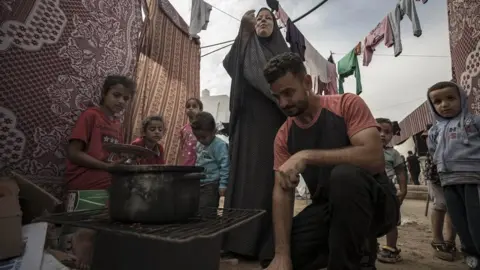Bolivia severs diplomatic ties with Israel over Gaza war
 EPA
EPABolivia has become the first Latin American country to cut diplomatic ties with Israel over what it describes as "aggressive and disproportionate" military actions in Gaza.
The country called for a ceasefire and said it would be supplying the blockaded Gaza Strip with aid.
An Israeli official said the move was "a surrender to terrorism".
Lior Haiat accused the Bolivian government of "aligning itself with the Hamas terrorist organization".
Bolivia's Deputy Foreign Minister Freddy Mamani said that the government had taken the decision to cut ties "in repudiation and condemnation of the aggressive and disproportionate Israeli military offensive taking place in the Gaza Strip".
He added that the country wanted an end to Israel's blockade that was preventing "the entry of food, water and other essential elements for life".
Gaza has been under an Israeli siege for weeks, with essential aid only reaching people through Egypt's Rafah crossing sporadically.
"Israel condemns Bolivia's support of terrorism and its submission to the Iranian regime, which attest to the values the government of Bolivia represents," Mr Haiat said in response.
Iran has been accused of providing support for Hamas to carry out the 7 October attacks. While Iran's leaders have celebrated and praised the violence, they have denied involvement.
Bolivia is not the only Latin American country to have begun taking diplomatic steps against Israel.
Chile's President Gabriel Boric said on Tuesday he was recalling the country's ambassador in Tel Aviv for consultations "given the unacceptable violations of International Humanitarian Law that Israel has incurred in the Gaza Strip."
"Chile strongly condemns and observes with great concern that these military operations - which at this point in their development entail collective punishment of the Palestinian civilian population in Gaza," he wrote on X, formerly Twitter.
Colombian President Gustavo Petro made a similar announcement on social media.
"I have decided to call our ambassador in Israel for consultation," Mr Petro said, adding that "if Israel does not stop the massacre of the Palestinian people we cannot be there."
Brazil's President Luiz Inácio Lula da Silva urged a ceasefire. Following reports of a new Israeli air strike in Gaza, Lula said on X: "We are seeing, for the first time, a war in which the majority of those killed are children... Stop! For the love of God, stop!"

More on Israel-Gaza war
- Follow live: Latest updates
- Explained: What is happening in Israel and Gaza, and why now?
- History behind the story: The Israel-Palestinian conflict
- Hostages: Who are the hostages taken by Hamas from Israel?

The majority of the 8,500 war deaths reported by the Hamas-run health ministry in Gaza are of adults but they include 3,500 children.
Israel has been bombing Gaza since the Hamas attack of 7 October that killed 1,400 people and saw at least 239 people taken hostage.
The US said on Tuesday that 66 trucks had been able to deliver aid inside Gaza, but charities warn that it will not be enough.
United Nations Relief and Works Agency (Unrwa) commissioner-general, Philippe Lazzarini said that prior to the war, about 500 trucks would enter Gaza each day.
Bolivia only restored diplomatic relations with Israel in 2019. It had previously cut ties with the country in 2009 under President Evo Morales, again to protest against Israel's actions in Gaza.
On Monday, Bolivia's President Luis Arce described Israel's actions in Gaza as "war crimes" on X after meeting with the Palestinian ambassador to Bolivia, Mahmoud Elalwani.
